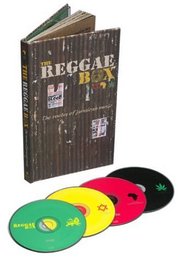Amazon.comAcross four discs and 87 songs, The Reggae Box tells the tale of Jamaica's modern social and political history through a well-rounded survey of the island nation's popular music. Disc 1 begins at the height of the independence movement in the 1960s, celebrated here with the exuberant, optimistic ska that blended the tropical sounds of mento and calypso with American R&B. Ska morphed into the smoother rock steady style, as artists began discovering the subtlety of the grooves while further exploring the sweetness of American soul. By disc 2, roots reggae and Rastafarianism moves to the fore. Delroy Wilson's 1971 hit "Better Must Come" displays the slowed-down, slinky rhythms and social messages that would define this period. By 1974, Augustus Pablo's dub enters the picture, an echo-laden psychedelic style. A new sound emerges on disc 3, lighter in both lyrical content and musical depth. Dancehall was geared to locals looking for fun, losing its political and social agenda, adding synthesized sounds, digital trickery, and a "singjay" vocal style that was half-spoken, half-sung. By disc 4, the deejays and sound systems of dancehall are firmly entrenched as reggae's most prominent forces, often reviving "old-school" tunes in a modern style. While some artists returned to social commentary and Rastafarianism, many others sang of the grim realities of sex and violence. The democratic approach to this set--each disc focuses on a single decade from the '60s through the '90s--gives listeners a broad and inclusive look at the genre's development and the shifts of popular taste. On the other hand, this goal of breadth may come at the expense of quality in some cases, especially if you believe that the '60s and '70s were clearly reggae's heyday. Still, as a comprehensive overview of Jamaican popular music of the last 40 years, complete with detailed song notes, informative essays that put the music in historical context, and attractive artwork and packaging, The Reggae Box has few flaws. --Marc Greilsamer

